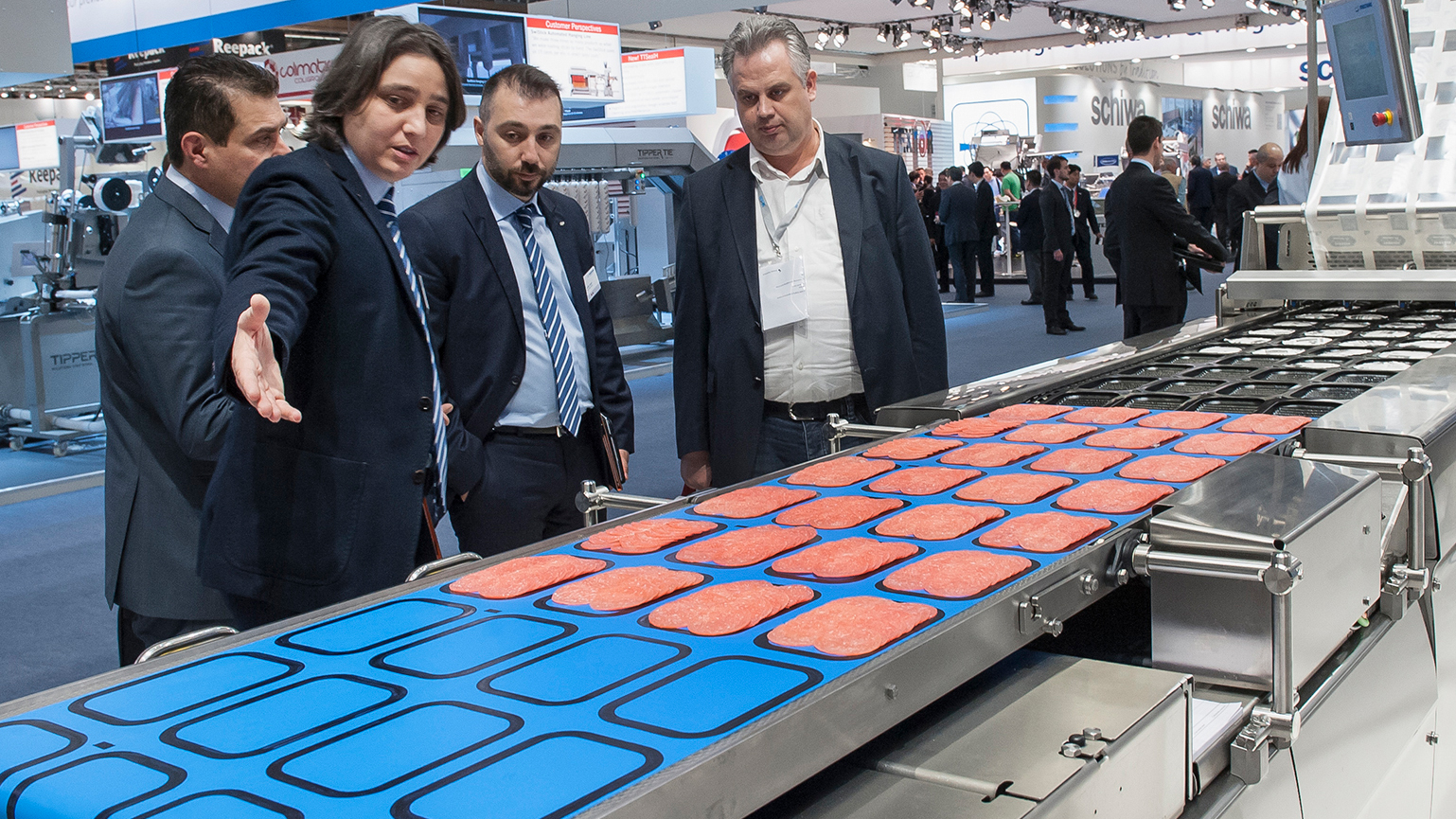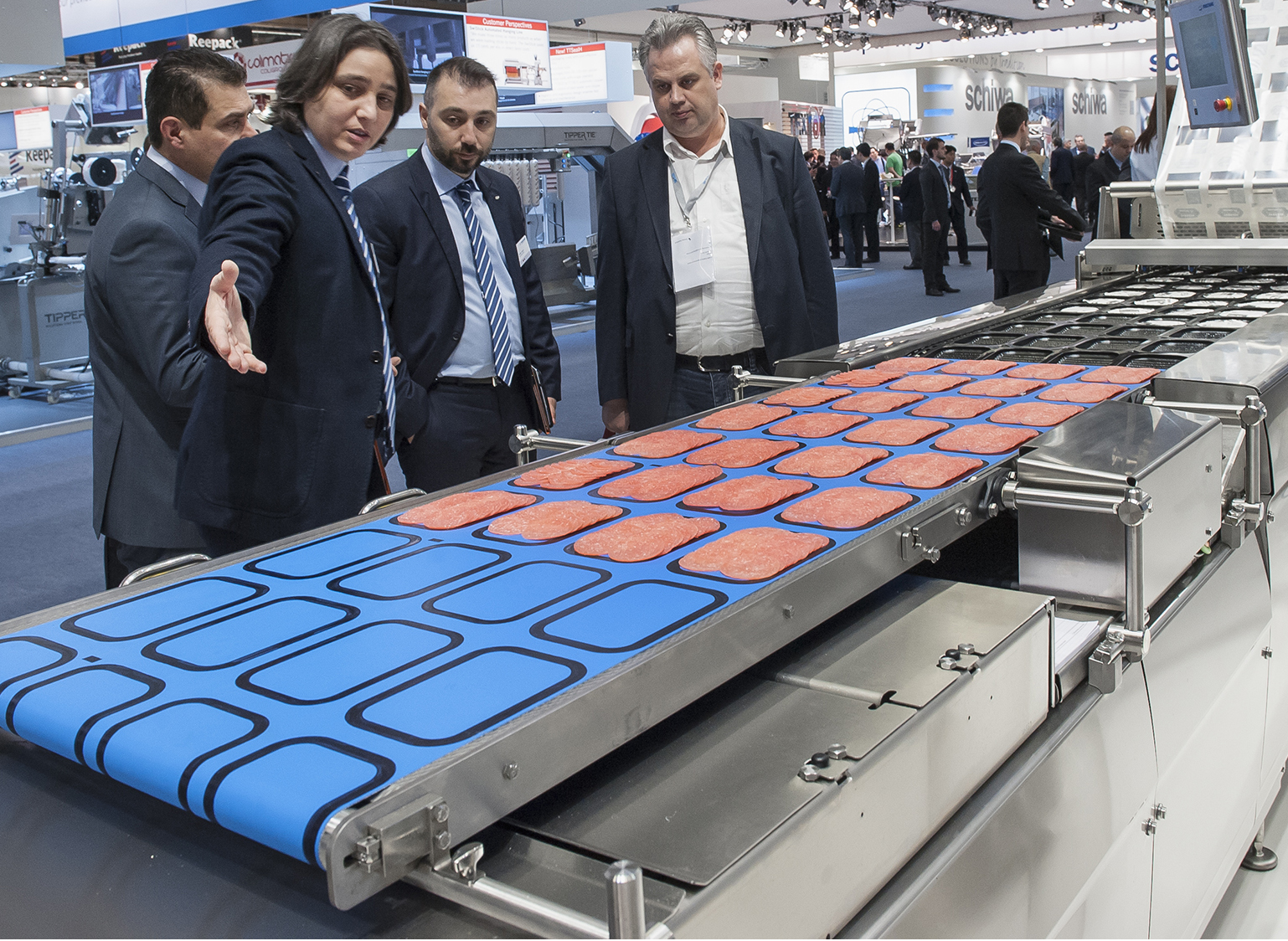Leading companies from the international packaging sector are set to present their latest technologies and offer insights into the latest trends in the meat industry at IFFA in Frankfurt am Main from 4 to 9 May 2019.
Less is more and protects the environment
Reducing the amount of packaging materials and the use of recyclable materials have been the subject of attention of consumers, manufacturers and the packaging industry since the publication of the EU Plastics Strategy in January 2018 and the German Packaging Law, which came into force this month. Light packaging with the same or better properties and superior stability make an important contribution to greater sustainability and resource conservation. Low weight means savings on raw material, energy and transport costs, as well as easier handling. Decisive for sustainable packaging is not only the film material used but also how it is processed. Thus, modern packaging machines permit the parameters of the film to be set exactly and thus keep down processing costs. Additionally, highly efficient feeding systems reduce the amount of film waste in the form of edge strips and punching scrap. In other words, significantly more packages can be produced from any given amount of film.
Skin packaging – sustainable and attractive
Innovative skin packaging with cardboard backing permits attractive product presentations and lower material consumption. The thin cardboard backing has a protective polymer coating as barrier against fat, moisture and oxygen, which lends additional stability to the packaging. A transparent film is used to cover the product and backing like a second skin. This fixes the product to the cardboard and provides reliable protection. Skin packaging of this kind can cut film consumption by up to 75 percent. The coating on the cardboard can be separated easily and both recycled without difficulty. Thanks to the printing and lack of design constraints, the cardboard backing attracts a high degree of attention at the point-of-sale, thus aiding brand differentiation. With product information printed on the cardboard, no additional labels are required, which also reduces material usage.

Modified atmosphere packaging extends shelf life
Modified atmosphere packaging (MAP) is evolving into the standard form of packaging for meat and sausage products. To this end, the air in the packaging is replaced by a mixture of gas suitable for the product, which can significantly retard the oxidative degradation process or the growth of microbes and mould. MAP can also reduce the breathability of the product, which results in an extended life in terms of freshness, taste and appealing appearance. Thus, the shelf-life of sausage products can be extended from two to four days, when packed in air, to two to five weeks in modified atmosphere packaging. Gas-proof barrier film with properties matching the product are used for this type of packaging.
Smart packaging
Multifunctional, active and intelligent packaging opens up completely new perspectives for the meat industry. Such packaging can monitor and record the environmental influences to which the product has been subjected along the value chain after the packaging stage. Integrated time-temperature indicators reveal the current quality status, degree of freshness, any breaches of the cool chain and whether the product is still suitable for consumption. Active packaging plays an ‘active’ role in any physical, biological and chemical changes taking place. It regulates the moisture in the packaging, absorbs oxygen or carbon dioxide and thus extends product shelf life. Bio-chemically active versions prevent the spread of microbes. Other smart packaging protects products from manipulation and hinders shoplifting.
Brand differentiation at the point-of-sale
Packaging not only provides information about ingredients, quality or environmental labels and product origins but also gives the contents a face and generates purchasing impulses. Which products land in the consumer’s shopping basket is mostly the result of a spontaneous consumer decision in which the appeal of the packaging and information contained thereon play an important role. When there is hardly any difference in product quality, a better package design can make the emotional difference. Investments in innovative, high-grade packaging strengthens the brand image and soon offer a substantial return for manufacturers of branded goods.
Optimum packaging solutions at IFFA
IFFA – The No. 1 for the meat industry – in Frankfurt am Main from 4 to 9 May 2019 presents innovations for all stages of the meat-processing chain. Trade visitors can see modern packaging technology for meat and sausage products, as well as poultry and fish, on both floors of Hall 11. Leading packaging companies, including Multivac, Sealpac, Tavil, Ulma, Variovac and VC999, will be represented there. Exhibitors from the packaging-materials sector, such as Flexopack, Krehalon und Schur Flexibles, will also be making presentations in Hall 11.
The run-up to IFFA 2019 is characterised by positive signs: more than 1,000 exhibitors from approx. 50 countries have already registered for the highlight of the sector and will occupy 120,000 square metres of exhibition space – eight percent more than at the previous event. The integration of the new Hall 12 gives IFFA the chance to expand. Additionally, the fair is being concentrated for the first time in the western section of Frankfurt Fair and Exhibition Centre, offering a comprehensive overview and a future-oriented trade-fair experience.
Full details about IFFA and tickets at www.iffa.com
Find out more about the international trade fairs held by the Food Technologies Business Unit of Messe Frankfurt at:
www.food-technologies.messefrankfurt.com
Press releases & images:
On the internet:
www.iffa.com/facebook
www.iffa.com/twitter
www.iffa.com/youtube
Background information on Messe Frankfurt
Messe Frankfurt is the world’s largest trade fair, congress and event organiser with its own exhibition grounds. With more than 2,500* employees at 30 locations, the company generates annual sales of around €715* million. Thanks to its far-reaching ties with the relevant sectors and to its international sales network, the Group looks after the business interests of its customers effectively. A comprehensive range of services – both onsite and online – ensures that customers worldwide enjoy consistently high quality and flexibility when planning, organising and running their events. The wide range of services includes renting exhibition grounds, trade fair construction and marketing, personnel and food services. With its headquarters in Frankfurt am Main, the company is owned by the City of Frankfurt (60 percent) and the State of Hesse (40 percent).
For more information, please visit our website at: www.messefrankfurt.com
*preliminary figures 2018
Download
- IFFA 2019 – focus on packaging (pdf, 143 KB)
